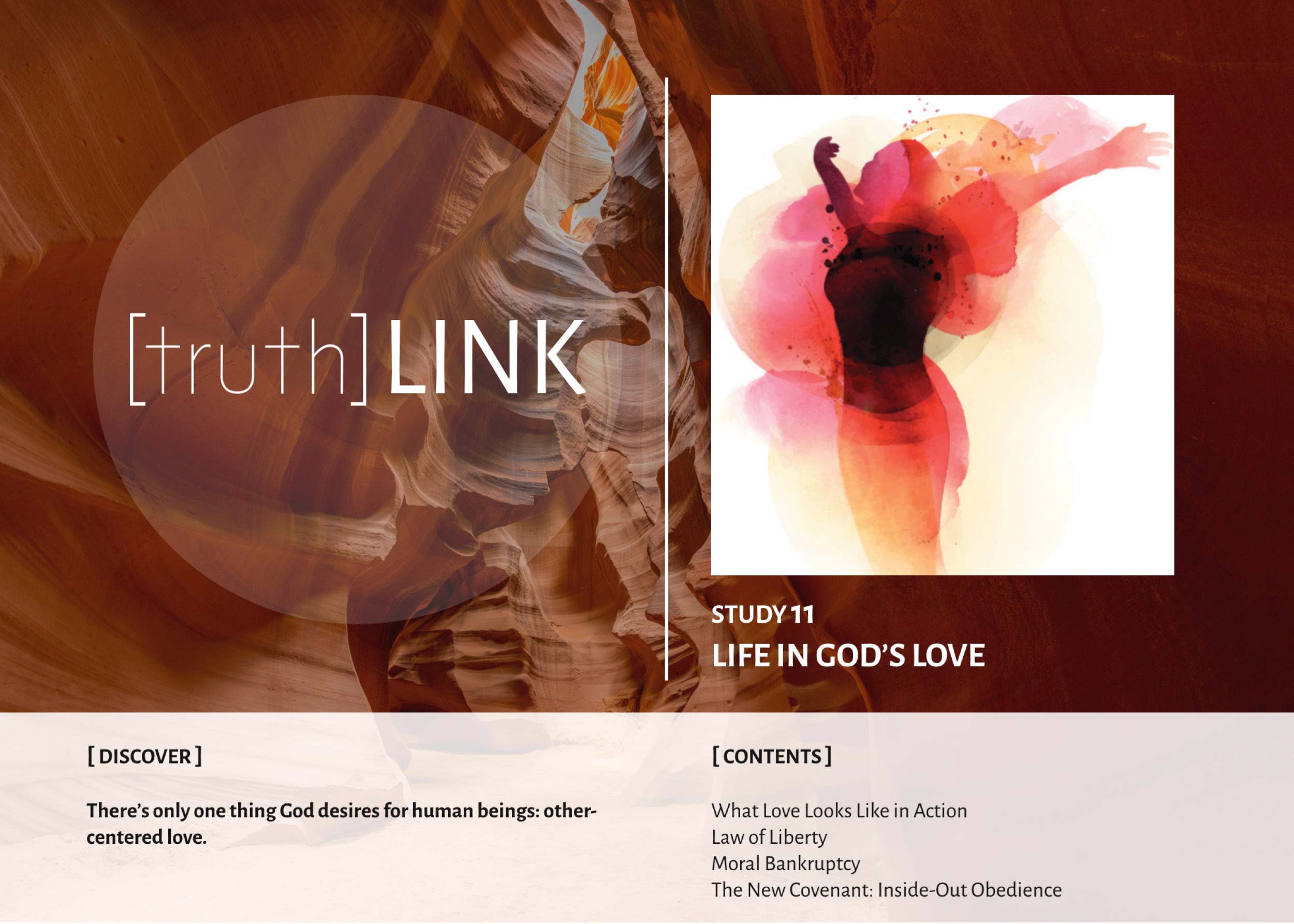
What Love Looks Like in Action
Imagine a city composed of millions of people, like Los Angeles, for example, in which every married couple is deeply in love and live every moment with unswerving faithfulness to one another, and every person is completely content with their own stuff and has no desire to possess other people’s stuff, and everybody can always be depended upon to tell the truth, and everybody totally loves and respects their parents, and everybody values the life and well-being of all others and never does anything to cause harm, with no violence or abuse of any kind, and nobody has a single broken or damaged relationship, and everybody knows God to be a God of perfect other-centered love and worships Him for who He is with happy, voluntary adoration.
Does that sound like a good place or a bad place, a happy place or a miserable place, the kind of place you’d like to live or get as far away from as possible? Of course, we all know that what we’ve just described is the best way imaginable for human beings to live. But here’s the thing: all we’ve actually done is describe what a community of human beings would look like in which all people live in harmony with God’s law, also known as the Ten Commandments. So what kind of law is this? Well, from the community we’ve described, it is a law of relational integrity. The first four of the Ten simply describe what love looks like in vertical action, toward God. The last six of the Ten describe what love looks like in horizontal action, toward our fellow human beings.
READ EXODUS 20:1-17 AND MATTHEW 22:36-40 AND DISCUSS HOW THE TEN COMMANDMENTS DESCRIBE WHAT LOVE LOOKS LIKE IN ACTION.
Because “God is love,” God’s law is love. And because God’s law is love, it is basically a transcript of His character. And because God’s law is a transcript of His character, it is as immutable, changeless, and eternal as God Himself. Map out the logic of the following scriptures to discover the changeless nature of God’s law:
Malachi 3:6; James 1:17; Hebrews 13:8; 1 John 4:8; Romans 13:10.
Law of Liberty
Some people don’t like the idea of God having a law, but this is usually because they misunderstand its nature and intent. The word “law” conjures up ideas of control, restriction, and arbitrary rules that run contrary to freedom and pleasure. But nothing could be farther from the truth.
James calls God’s law ”the perfect law of _____________” (James 1:25).
David says of God’s law: “I will ______ the course of Your commandments, for You shall ______________ my heart” (Psalm 119:32).
The human capacity for freedom and happiness expands within the large parameters of relational faithfulness and constricts within the narrow parameters of relational violation. The law of God is not restrictive, in fact. To the contrary, it is liberating in the extreme. It doesn’t decrease the human experience of freedom and pleasure, but rather increases freedom and pleasure to the maximum degree possible.
Who is happier, the person that is known to be honest and, therefore, has the confidence and trust of everyone, or the person who lies and cheats and is trusted by no one? Who has the larger capacity for fulfillment, the couple that remain devoted to one another for life and, therefore, experience deeper and yet deeper layers of security, intimacy, and trust, or the couple who violate one another by engaging in extramarital affairs? Who is more free, the person whose emotions are angry and whose actions are violent, or the person who feels no ill will toward anyone?
Point made.
Moral Bankruptcy
But there is a problem, and it’s serious. The apostle Paul describes our predicament perfectly:

So there is nothing wrong with God’s law, but there is something deeply wrong with us. The word used by Scripture to describe our fundamental brokenness is “sin,” and “sin” is simply defined as “transgression of the law” (1 John 3:4, KJV), and the law is “love” (Romans 13:10). So to say we are “sinners” is to say that we are bent away from love toward selfishness. We are in a condition that Martin Luther described as, “homo incurvatus in se,” Latin for, “man curved inward toward self.” Our self-serving inclination is so strong that Paul employs the language of slavery: we are “sold under sin,” he says. Left to ourselves, no matter how hard we try, we find it impossible to live in harmony with God’s perfect law of love. We are bankrupt of moral power. We need something more than a self-help book, a religious practice, a medication, or a boost of good old-fashioned willpower.
We need a Savior.
Enter Jesus!
The New Covenant: Inside-Out Obedience
Through Jesus Christ God has provided a salvation arrangement the Bible calls, “righteousness by faith” (Galatians 5:5).
In two messianic prophecies, Jeremiah ascribed a revealing title to the coming Savior: “THE LORD OUR RIGHTEOUSNESS” (Jeremiah 23:6 and 33:16). Here is the idea of righteousness being provided as a gift from an outside source, as opposed to the human being having to manufacture righteousness for himself within himself. It is the Lord’s righteousness and, yet, it is ours. He, Himself, is “OUR RIGHTEOUSNESS.”
When we come to the New Testament, the apostle Paul expands this magnificent idea. He teaches that God saves sinners by attributing to them the righteousness of Christ. By virtue of the righteous life and atoning death of Christ, God does something remarkable for sinners: He “calls those things which do not exist as though they did” (Romans 4:17). God relates to us as if we were righteous even though we are not, as if we have never sinned even though we have, as if we were innocent even though we are guilty.
Paul calls this unilateral divine action “the free gift,” and “the grace of God and the gift by the grace of the one Man, Jesus Christ,” and “the gift of righteousness” (Romans 5:15, 17). Then he summarizes the idea like this:
“For as by one man’s disobedience (Adam’s sin) many were made sinners, so also by one Man’s obedience many will be made righteous” (Romans 5:19).
In other words, the obedience of Jesus to God’s law is a representative obedience given as a free gift to sinners. And yet, God does not relate to us as righteous in order to confirm us in our unrighteousness, but rather for the purpose of lifting from our hearts all sense of condemnation and the anxiety of trying to earn salvation, persuading us of His unconditional love for us, showing His vision for us, and arousing faith in us. Then, once the relationship with God has been restored on the premise of His grace—His unmerited favor—obedience to God’s law begins to spring forth from the inside out. It is faith responding to faith, love responding to love.
Which brings us to the new covenant.
When God gave Israel His law at Mount Sinai, the people miscalculated their own moral condition and made the self-confident promise to God, “All that the Lord has said we will do and be obedient” (Exodus 24:7). What followed was a long history of disobedience, rebellion, and sin of every description, punctuated with repeated promises to obey God’s law. This became known as the “first” or “old” covenant (Hebrews 8:7, 13). But God had something else in mind all along, which became known as the new covenant, which is based on God’s promise to forgive sins and write His law in our hearts.
Read Jeremiah 31:31-34 and Hebrews 8:7-12 and discuss the specifics of the new covenant.
[CONNECT]
Within a new covenant relationship with God, we do not keep the law as a means of earning salvation, but rather as the love-motivated outgrowth of the salvation we have as a free gift in Christ.
In Romans 7:1-6, Paul uses marriage as a metaphor to illustrate the difference between the old covenant and the new covenant. If a woman has a husband, he reasons, she is bound by the law to her husband as long as he lives. If she marries another man, she is committing adultery. But if her husband dies, she is free to marry another man.
Paul then likens the first husband to our effort to secure salvation through the law, and the second husband to Christ as the only real means of salvation. He urges us to “become dead to the law” as a means of salvation and to get “married” to Christ as our Savior. Then we are in a relationship with God in which we “serve in newness of the spirit and not in oldness of the letter” (verse 6).
In other words, in the old covenant paradigm we attempt to obey the letter of the law to merit right-standing with God, whereas in the new covenant we relate to God on the premise that we already have His favor through Christ and, therefore, we obey His law from the heart because we are motivated and empowered by His love.
[EXPERIENCE]
It is my heartfelt desire to be a new covenant follower of Jesus.
I confess my complete inability in myself to live in obedience to God’s law of love, embracing by faith the righteousness of Christ as my only hope and asking Him to write His law in my heart. May my experience be that described by King David and his passionate prayer, “I delight to do Your will, O my God, and Your law is within my heart” (Psalm 40:8).
Phone 1300 300 389























